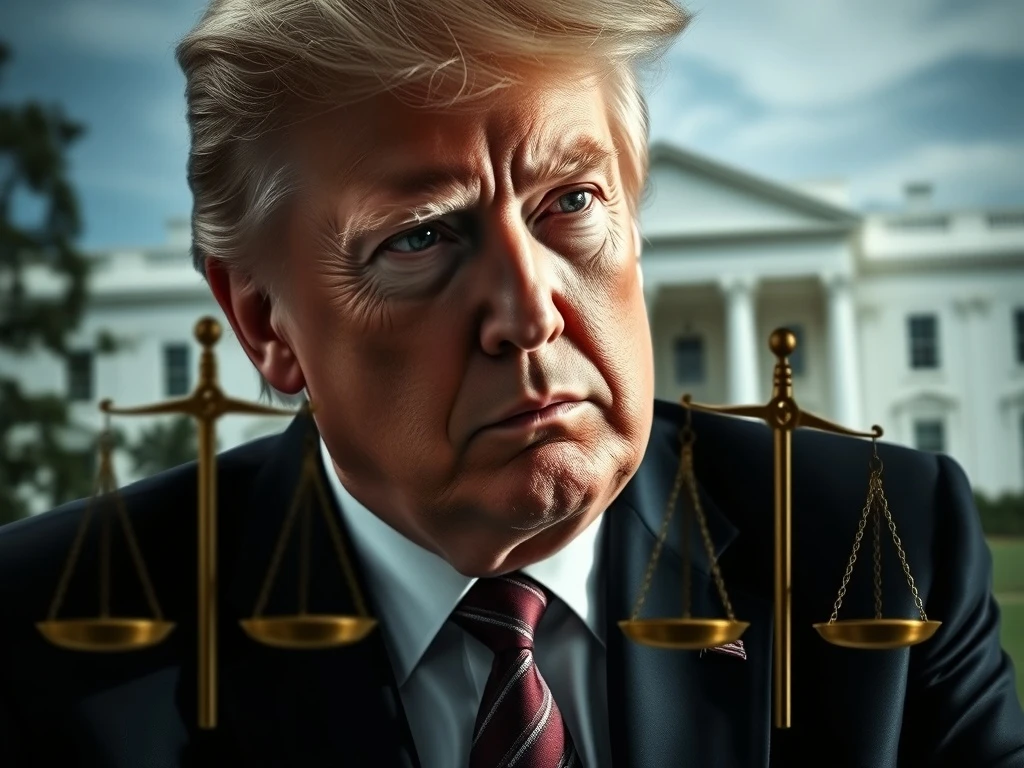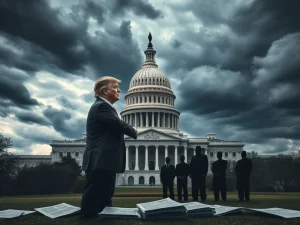Trump Crypto Pardons: Unveiling Alarming Ethics Concerns and Their Ripple Effect

The recent wave of Trump crypto pardons has ignited a fierce debate. These acts of clemency for prominent figures in the cryptocurrency industry signal a concerning trend. President Donald Trump has extended pardons to several convicted crypto executives, including Changpeng Zhao (CZ), sparking widespread discussion about ethics and potential corruption. Many observers question the motivations behind these decisions.
The Controversial Clemency of Changpeng Zhao
US President Donald Trump pardoned Changpeng Zhao, widely known as CZ, on October 21. The former Binance executive became the latest addition to a growing list of convicted crypto figures receiving clemency from the White House. Zhao had previously served a four-month prison sentence, handed down in April 2024. His conviction stemmed from a failure to maintain an effective Anti-Money Laundering (AML) program at Binance, the exchange he co-founded.
Binance itself pleaded guilty to violating US money laundering laws. Investigators found the exchange helped users bypass sanctions. Consequently, Binance paid a substantial fine of $4.3 billion. White House Press Secretary Karoline Leavitt defended the Changpeng Zhao pardon. She stated the charge was part of a “war on cryptocurrency” under the administration of ex-President Joe Biden. Leavitt added, “The president wants to correct this overreach of the Biden administration’s misjustice and he exercised his constitutional authority to do so.” Zhao expressed his deep gratitude for the pardon on X.
Ross Ulbricht Clemency: A Pioneer or a Criminal?
On the second day of his term, Trump pardoned Ross Ulbricht. Ulbricht founded Silk Road, an online narcotics marketplace. He had already served 11 years of a life sentence without parole. Ulbricht was convicted under the “kingpin clause” for high-level narcotics offenders. His site accepted cryptocurrencies like Bitcoin (BTC) as payment. The Ross Ulbricht clemency followed extensive lobbying efforts.
Activists from diverse backgrounds supported Ulbricht’s pardon. Criminal reform groups argued the kingpin clause was excessively harsh. Libertarian groups believed selling drugs, while illegal, wasn’t a moral failing for consenting adults. Some in the crypto community viewed him as a pioneer of crypto payments. They acknowledged the illicit nature of the goods exchanged. Trump voiced his support on Truth Social. He claimed, “The scum that worked to convict him were some of the same lunatics who were involved in the modern day weaponisation of government against me.” Supporters have since donated tens of thousands of dollars, some in crypto, to help Ulbricht reintegrate.
BitMEX Executives Pardoned: Unexplained Decisions
In March, Trump also pardoned four executives of the cryptocurrency exchange BitMEX. These individuals included Arthur Hayes, Benjamin Delo, Gregory Dwyer, and Samuel Reed. They were all serving various sentences for violating the Bank Secrecy Act. In February 2022, Hayes and Delo pleaded guilty. They admitted to willfully failing to “establish, implement and maintain an Anti-Money Laundering program” at the exchange. Reed entered a plea weeks later, followed by Dwyer in August.
Delo received a sentence of 30 months in prison. Dwyer, Reed, and Hayes were to serve probation and pay fines. The exchange itself faced a $100 million fine. Unlike other high-profile pardons, the White House provided no public statement explaining its reasoning for the BitMEX executives pardoned. BitMEX also refrained from commenting. Hayes simply posted a public “Thank you” on X. This lack of transparency fueled further questions about the pardon process.
Ken Kurson’s Pardon and Political Connections
On the morning of his first term’s final day, Trump pardoned Ken Kurson. Kurson was a Ripple board member and co-founder of crypto media outlet Modern Consensus. He was a friend of Trump’s son-in-law, Jared Kushner. Kurson had been convicted of cyberstalking his ex-wife. He joined Ripple’s board in 2016, serving until 2020 when harassment charges emerged.
A White House pardon message stated, “Mr. Kurson’s ex-wife wrote on his behalf that she never wanted this investigation or arrest and, ‘repeatedly asked for the FBI to drop it.'” Trump argued his prosecution was solely because Kurson was nominated for a role in the Trump Administration. Kurson was considered for the National Endowment for the Humanities board. In 2018, he was removed from consideration after FBI allegations of stalking and harassment surfaced. Journalist Deborah Copaken claimed Kurson passed her over for a job after she rebuked his sexual advances. Following the pardon, she expressed fear, saying, “I’m terrified I’m going to be looking over my shoulder every day.”
Escalating Crypto Ethics Concerns
The pattern of these pardons raises significant crypto ethics concerns. While the Trump administration pardoned fewer individuals than, for instance, former President Barack Obama, the nature of these pardons differs greatly. Obama’s more than 1,300 pardons largely addressed low-level drug offenses. These were part of a broader criminal justice reform initiative. In contrast, Trump has pardoned high-profile individuals, often those with political or financial ties.
For example, he issued a blanket pardon to rioters involved in the January 6 occupation of the Capitol. The pardon of Zhao is particularly problematic. Binance, an entity Zhao reportedly still largely owns, was a significant investor in Trump’s crypto project, World Liberty Financial. The New Yorker reported that Binance lobbied Trump-associated lawyers to secure a pardon. Palantir co-founder Joe Lonsdale commented on the situation. University of Minnesota law professor Richard Painter, who served as George W. Bush’s chief ethics lawyer, stated, “Corruption scandals have usually involved campaign money going to politicians, from both parties … This is the first time one has involved the President’s personal businesses and personal money.” Not all crypto crimes, however, go unpunished. Celsius CEO Alex Mashinsky received a 12-year prison sentence for fraud related to his platform’s collapse. Jay Clayton, the Trump-nominated US attorney who led the prosecution, called the suggested 20-year sentence a “critical warning to other entrepreneurs, executives, and promoters in the cryptocurrency industry.”
High-Profile Figures Seeking Trump Crypto Pardons
Other crypto executives, either accused or convicted of wrongdoing, have publicly appealed for Trump crypto pardons. Sam Bankman-Fried, currently serving 25 years for fraud and conspiracy following FTX’s collapse, is reportedly seeking clemency. In a February interview, he claimed unfair treatment from Judge Lewis Kaplan, who also oversaw a libel case against Trump. “I know President Trump had a lot of frustrations with Judge Kaplan. I certainly did as well,” Bankman-Fried stated. His parents have reportedly met with members of the Trump administration to advocate for their son.
Early Bitcoin adopter Roger Ver pursued a similar strategy. Accused of tax evasion and under house arrest in Spain awaiting US extradition, Ver claimed he was a victim of “lawfare.” He released a “documentary” comparing his situation to legal actions against Trump regarding the January 6 riots. Ver ultimately did not need a pardon. He fought extradition and agreed to pay $50 million in back taxes to the US after admitting misconduct. Anatoly Legkodymov, co-founder of Bitzlato, also made a request. He pleaded guilty to processing $700 million from the Russian dark web. He received a sentence of time served on July 18, 2024, after 18 months in prison. Ivan Melnikov, vice president of the Russian branch of the International Committee for Human Rights, asserted, “Anatoly … became a target in a political campaign against the crypto market and talented Russian programmers.”
The Future of Crypto Regulation Amidst Political Influence
The implications of these pardons extend beyond individual cases. They highlight the growing intersection of cryptocurrency, politics, and legal accountability. The “war on cryptocurrency” narrative, often invoked by Trump’s supporters, suggests a deliberate effort to curb innovation. Conversely, critics argue that these pardons undermine regulatory efforts and foster an environment ripe for corruption. The selective nature of these clemency decisions raises questions about fairness and equal application of the law.
As crypto ethics concerns intensify, the industry faces an uncertain regulatory future. Policymakers must balance fostering innovation with ensuring robust consumer protection and preventing illicit activities. The ongoing debate between strict enforcement and a more lenient approach will undoubtedly shape the crypto landscape for years to come. These high-profile pardons serve as a stark reminder of the significant political influence now at play within the cryptocurrency sector. More high-profile pardons may yet emerge as crypto continues to take center stage in American politics.










